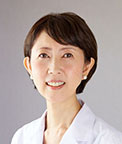Department of Child and Adolescent Psychological Medicine
Overview of the department

Chairman
Prof. Tomoda Akemi
Consultation system and therapeutic strategies
Methods to consult our department
A reservation system is available. Please make a reservation by telephone before visiting our department. Patients referred from other hospitals can use a community medicine promotion system.
Outpatient services
Based on the contents of our conversation when making a reservation, an attending physician and the date of consultation are determined. A family consultation fee (not reimbursed by health insurance) is necessary if your child cannot come with you. No consultation can be made by telephone or e-mail.
Age
As a rule, children aged 0-17 years at the time of initial consultation are accepted.
Strategies
Care for individual children and families is provided based on the latest findings available in various fields such as developmental pediatrics, psychiatry/neurology, neuroscience, psychology, pedagogy, and epidemiology. As a rule, inpatient care is not available.
Fields of expertise
We provide comprehensive support for various childhood psychological issues designated as developmental and secondary disorders, as described below, in accordance with each person’s life stage.
1) Autism spectrum disorder (ASD)
(pervasive developmental disorder (PDD))
2) Attention deficit/ hyperactivity disorder (AD/HD)
3) Learning disability (LD)
4) Developmental coordination disorder (DCD)
5) Tic disorder/ Tourette syndrome
6) Childhood psychosomatic disease (such as irritable bowel syndrome)
7) Truancy/ withdrawal
8) Anxiety disorder/ obsessive?compulsive disorder
9) Post-traumatic stress disorder (PTSD), Reactive attachment disorder(RAD)
10) Somatization disorder
11) Dissociative disorder
12) Childhood depressive state/ depression
13) Infantile/ childhood/ adolescent sleep disorder
14) Childhood chronic fatigue syndrome
15) Depilation/ alopecia, stuttering, mutism, enuresis
Currently, children with eating disorders (anorexia/bulimia) are not accepted for consultation. Instead, they are referred to the Department of Neuropsychiatry or appropriate facilities.
Advanced medical practice
We are exerting efforts to provide optimal diagnostic and treatment methods that are currently used, to clarify the pathogeneses of various diseases, and to develop new diagnostic and treatment methods to support psychological development during childhood. With respect to current clinical trials and studies, please contact the Center of Clinical Research and Advanced Medicine.
Symptoms and diseases treated in our department
If the following behavioral or developmental problems are observed, please consult our department:
“restlessness,” “forgetfulness,” “rebelliousness,” “dislike of close relationships,” “being weak in group activities,” “becoming fixated on something,” “delayed language development,” “difficulties/ delay in learning,” “messy handwriting, awkwardness, slow reflexes,” “developmental disorder,” “tic disorder,” “truancy,” “frequent headache, abdominal pain, and nausea,” “inability to get up in the morning,” “days and nights are reversed,” “withdrawal,” “worrying about cleanliness,” “mood disorder,” and “being irritated.”
Primary examinations and explanations
Some children show physical disease related activities resembling those associated with developmental or mental problems. The fewest tests required are conducted to assess the presence or absence of physical disease. Furthermore, various cognitive function tests are conducted to ascertain the child’s characteristics and to identify their strong and weak points.
1) Developmental/ intelligence tests (WISC-IV, WAIS-III, Tanaka-Binet)
2) Personality/ psychological tests (SDS, oral reading test, K-ABC)
3) Continuous processing tasks (CPT) using a personal computer
4) Imaging procedures such as MRI
5) Electroencephalography
6) Blood test
7) Gaze Finder(See Figure)
 University of Fukui Hospital
University of Fukui Hospital University of Fukui Hospital
University of Fukui Hospital +81-776-61-311
+81-776-61-311 Access
Access